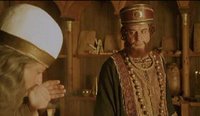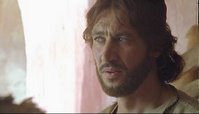Joseph of Nazareth - Scene Analysis
 Having recently reviewed Joseph of Nazareth, and posted a review and some scene analysis for the thematically similar The Nativity Story. In fact the prominence of Joseph in The Nativity Story means that these two films are probably the most in depth looks at Joseph in English language film history. Anyway, on to the scene guide...
Having recently reviewed Joseph of Nazareth, and posted a review and some scene analysis for the thematically similar The Nativity Story. In fact the prominence of Joseph in The Nativity Story means that these two films are probably the most in depth looks at Joseph in English language film history. Anyway, on to the scene guide...Joseph the carpenter - (Matt 13:55)Notes
[extra-biblical episode]
Joseph meets Mary - (Matt 13:55)
[extra-biblical episodes]
Annunciation - (Luke 1:26-38)
[extra-biblical episode]
Mary visits Elizabeth - (Luke 1:39-45)
[extra-biblical episode]
Magnificat - (Luke 1:46-55)
[extra-biblical episode]
Mary returns to Nazareth - (Luke 1:56)
[extra-biblical episode]
Joseph discovers Mary is pregnant - (Matt 1:18-19)
Joseph's 1st dream - (Matt 1:20-21)
Joseph tells Mary - (Luke 1:31)
Joseph and Mary married - (Gen 2:18-19 cited)
Census - (Luke 2:1-3, Matt 1:15)
Mary and Joseph at Bethlehem - (Luke 2:4-5)
Birth of Jesus - (Luke 2:6-7)
Shepherds and Angels - (Luke 2:8-20)
Arrival of the Magi - (Matt 2:1-11)
Joseph's 2nd Dream - (Matt 2:13-15)
Slaughter of the Innocents - (Matt 2:16-18)
[extra-biblical episodes]
Joseph and Jesus - (Is 2:2-4, 14:7, 35:1, 25:8, 65:17 cited)
Joseph's 3rd Dream - (Matt 2:19-23)
[extra-biblical episode]
Boy Jesus - (Luke 2:41-51, Luke 12:22-28 cited)
[extra-biblical episode]
[Closing Citation] - (Is 14:7, 35:1, 25:8, 65:17)
 Obviously this film, at least when depicting biblical scenes is a harmonisation of the gospels of Luke and Matthew. There are a few limited references to the Protoevangelium of James (such as the names of Mary's parents), and a fair bit of Josephus (notably regarding Herod and his sons) but otherwise it's Matt and Luke all the way.
Obviously this film, at least when depicting biblical scenes is a harmonisation of the gospels of Luke and Matthew. There are a few limited references to the Protoevangelium of James (such as the names of Mary's parents), and a fair bit of Josephus (notably regarding Herod and his sons) but otherwise it's Matt and Luke all the way.At some point later, I plan to post a list of uncanny similarities between these two films, for now I'll simply note how the film omits a few key passages, in particular Jesus's presentation at the temple, and the prophecies about him by Simeon and Anna. We also don't see why the Magi return by a different route. It also omits both the birth of John, and the miraculous events surrounding his conception. It does however include the story of Jesus's trip to the temple.
 Speaking of which, one of the things we overhear Jesus say on this occasion are the words from Luke 12:22-28, (Consider the lilies/ravens). It's plausible I suppose that Jesus's great wisdom even at this point included some of the insights he would become famous for as an adult, but somehow the scene didn't ring true for me at least. I find it quite hard to believe this scene really happened as Luke has it. I'd certainly be quite keen to hear the literary/theological arguments for it's inclusion as the sole incident in almost 30 years of Jesus's life.
Speaking of which, one of the things we overhear Jesus say on this occasion are the words from Luke 12:22-28, (Consider the lilies/ravens). It's plausible I suppose that Jesus's great wisdom even at this point included some of the insights he would become famous for as an adult, but somehow the scene didn't ring true for me at least. I find it quite hard to believe this scene really happened as Luke has it. I'd certainly be quite keen to hear the literary/theological arguments for it's inclusion as the sole incident in almost 30 years of Jesus's life.There are a number of additions to the story. As mentioned above Josephus is used, in particular to flesh out the character of Herod. But there is a fair amount of fiction here as well. Joseph's life in Nazareth, his relationship with his cousins turned zealots and his involvement with Herod are all used to enhance the story. Interestingly, we also see Herod making a rash promise to Joseph in a manner reminiscent of his later promise to Herodias's daughter.
 We also get a good range of Joseph's dreams. Three of the four are included, with the common practice of combining the final two being used again here. In this film though we do not see an angel for any of the announcements and dreams. Joseph hears God speak in his own voice. It's an old technique of course, but having seen it used a couple of times recently, it makes me wonder whether you would really do some thing as radical (as it was then) as not divorcing your (apparently) unfaithful wife merely on the strength of hearing your own voice speak to you in a dream.
We also get a good range of Joseph's dreams. Three of the four are included, with the common practice of combining the final two being used again here. In this film though we do not see an angel for any of the announcements and dreams. Joseph hears God speak in his own voice. It's an old technique of course, but having seen it used a couple of times recently, it makes me wonder whether you would really do some thing as radical (as it was then) as not divorcing your (apparently) unfaithful wife merely on the strength of hearing your own voice speak to you in a dream.Having only watched The Nativity Story once but having seen this once and dipped in and out of most scenes a couple of times, I'm actually more familiar with this film than The Nativity Story. I'm planning to watch that again soon though.
Labels: Close to Jesus Series, Joseph of Nazareth, Nativity - Mary Joseph, Scene Guides














0 Comments:
Post a Comment
<< Home